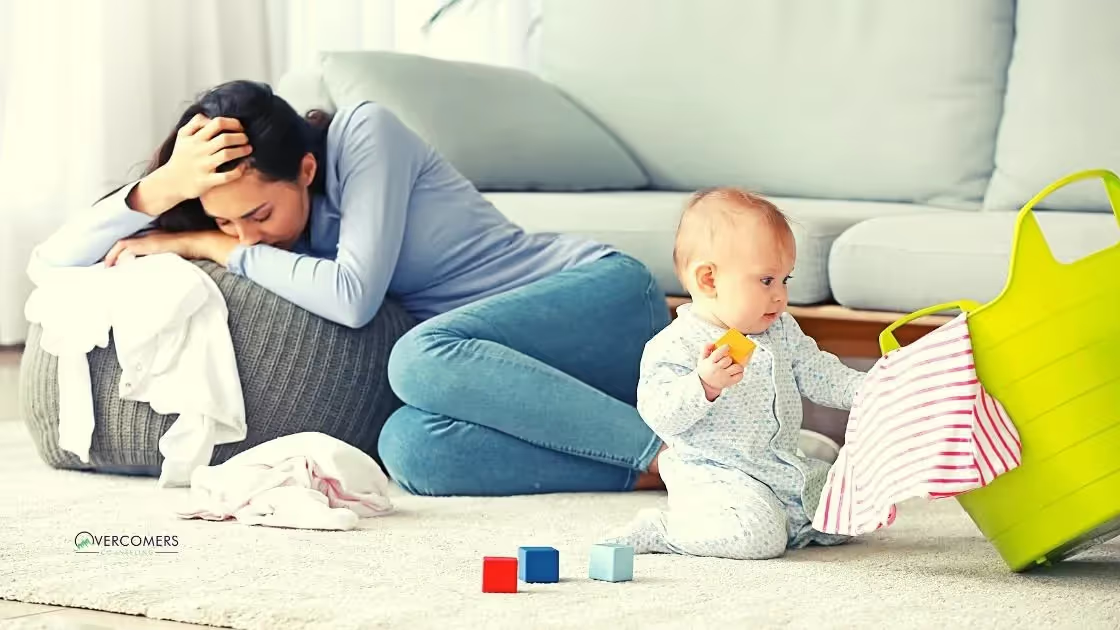The birth of a newborn baby is one of the miracles of existence. Becoming a parent is a joyous and singular experience in life. And yet, many people suffer...

The birth of a newborn baby is one of the miracles of existence. Becoming a parent is a joyous and singular experience in life. And yet, many people suffer from postpartum depression. Postpartum depression can have serious effects on the mental, emotional and physical health of all members of a family. Postpartum depression should not be ignored or dismissed. If you think you or a loved one is suffering from postpartum depression, seek the counsel of a licensed professional. So, what causes postpartum depression?
Nobody knows for certain what causes postpartum depression, but there are many symptoms and risk factors to consider. Being aware of these symptoms and risk factors can give us a better understanding of what causes postpartum depression, and how to seek the best advice and counsel. After childbirth, many people experience what is commonly called the 'baby blues'. Symptoms of the baby blues include: feeling overwhelmed, loss of sleep, trouble concentrating, appetite issues, moodiness, crying and a general feeling of sadness. The baby blues is a common experience for many, but it should only last a few days. If these symptoms and others persist, then you may be suffering from something more serious- postpartum depression. Understanding what causes postpartum depression, including its severe and persistent symptoms, will give you a better framework for seeking treatment. Remember, the symptoms of postpartum depression can manifest themselves during pregnancy, persist afterwards, or even appear up to a year after the birth.
Some of the symptoms of postpartum depression include: ithenability to bond with your baby and giving up on relationships with family or friends. Others include: not enjoying hobbies or entertainment like you used to, being afraid you're not a good mother, doubting your significant other's motives ,and extreme fatigue. Cutting yourself off from others who care about you, especially when you are suffering, is dangerous for your psychological health. And doubting your or your significant other's abilities to care for the baby, or even love the baby is damaging. Even the physical symptoms of postpartum depression like fatigue, sleep loss, and inability to concentrate can endanger the baby's welfare. Symptoms of what causes postpartum depression should not be ignored- they are serious.
In addition to symptoms of postpartum depression, there are risk factors that can help you better understand what causes postpartum depression. Anyone can experience postpartum depression, and if you do, it's not your fault. And yet, there are certain risk factors that may make what causes postpartum depression more discernable, and even predictable. If you or a family member have suffered from depression, mood swings, or bipolar disorder, then you may be at risk for what causes postpartum depression. If you have difficulty breastfeeding, your newborn has health complications, or special needs then you may be at risk for what causes postpartum depression.
If you are experiencing financial problems, marital issues, job loss, or personal drama then you may be at risk for what causes postpartum depression. If yours was an unplanned or unwanted pregnancy, or you don't have a stable support system then you may be at higher risk for postpartum depression. Again, anybody can suffer from postpartum depression- there is no certain way to prevent or predict it. But awareness of these and other risk factors can better help you and your professional counselor discern what causes postpartum depression.
Obviously, childbirth brings about physical changes in the body. These physical changes may contribute to what causes postpartum depression. After childbirth, hormone levels drop, often causing fatigue, mental dullness, and aching. All of which can make the physically demanding task of caring for a baby more difficult. This rapid drop in hormone levels can also make it difficult to complete everyday tasks and chores. Being physically unable to care for your home and your baby's needs can cause feelings of depression and inadequacy.

A sudden drop in hormones after childbirth may also cause emotional changes. Remember, the body and the mind are intertwined, affecting one another on every level. Emotional stress can wreak havoc on your immune and nervous systems. Emotional stress is an integral part of what causes postpartum depression. The emotional changes involved in postpartum depression may cause you to feel less attractive or even question your identity. They may also cause anxiety and self-doubt, especially about your ability to care for your newborn. When you feel incapable of caring for your newborn, it may cause paralyzing feelings of inadequacy. Additionally, anxiety and self-doubt often cause sleep loss and/or insomnia which only exacerbates an already difficult situation. Emotional changes contribute to what causes postpartum depression and should be addressed immediately with the help of a professional, licensed counselor.
If left untreated, postpartum depression can escalate into a more severe, rare condition called 'postpartum psychosis' which typically develops after the first week of delivery. Symptoms of postpartum psychosis are severe and dangerous and may include: hallucinations, disorientation, and paranoia. It may also cause you to have suicidal thoughts or thoughts of harming your baby. Postpartum psychosis may lead to life-threatening consequences. If you believe that you or someone you know is suffering from postpartum psychosis, seek immediate treatment from a licensed professional.
We have asked the question- What causes postpartum depression? Postpartum depression is a serious, sometimes life-threatening condition. There are certain risk factors that may contribute to what causes postpartum depression. And yet, remember that anybody can suffer from postpartum depression. It's never your fault. The signs, symptoms, and causes of postpartum depression should never be ignored, taken lightly, or dismissed. Childbirth is a joyous and beautiful experience. If you or someone you know suffers from postpartum depression, there is hope. Don't go it alone. Seek the help of a licensed professional counselor. There is light at the end of the tunnel, there is healing. Get help today.
https://www.amazon.com/This-Isnt-What-Expected-2nd/dp/B07HJ9KTTS/ref=sr_1_1?crid=107AJR2ATYCPY&keywords=postpartum+depression&qid=1657647122&s=audible&sprefix=postpartum+depression%2Caudible%2C67&sr=1-1
https://www.amazon.com/Down-Came-Rain-Brooke-Shields-audiobook/dp/B0009K7J1O/ref=sr_1_2?crid=107AJR2ATYCPY&keywords=postpartum+depression&qid=1657647144&s=audible&sprefix=postpartum+depression%2Caudible%2C67&sr=1-2
Postpartum depression usually arises from a mix of factors rather than a single cause: the sudden drop in hormones like estrogen and progesterone after childbirth, a personal history of depression or other mental-health conditions, and major life stressors. Physical and emotional exhaustion from childbirth and caring for a newborn, chronic sleep deprivation, and limited support from a partner, family, or friends can all increase the risk. Overcomers Counseling provides compassionate, practical care to help new parents understand these contributors and find steady, evidence-based support as they recover.